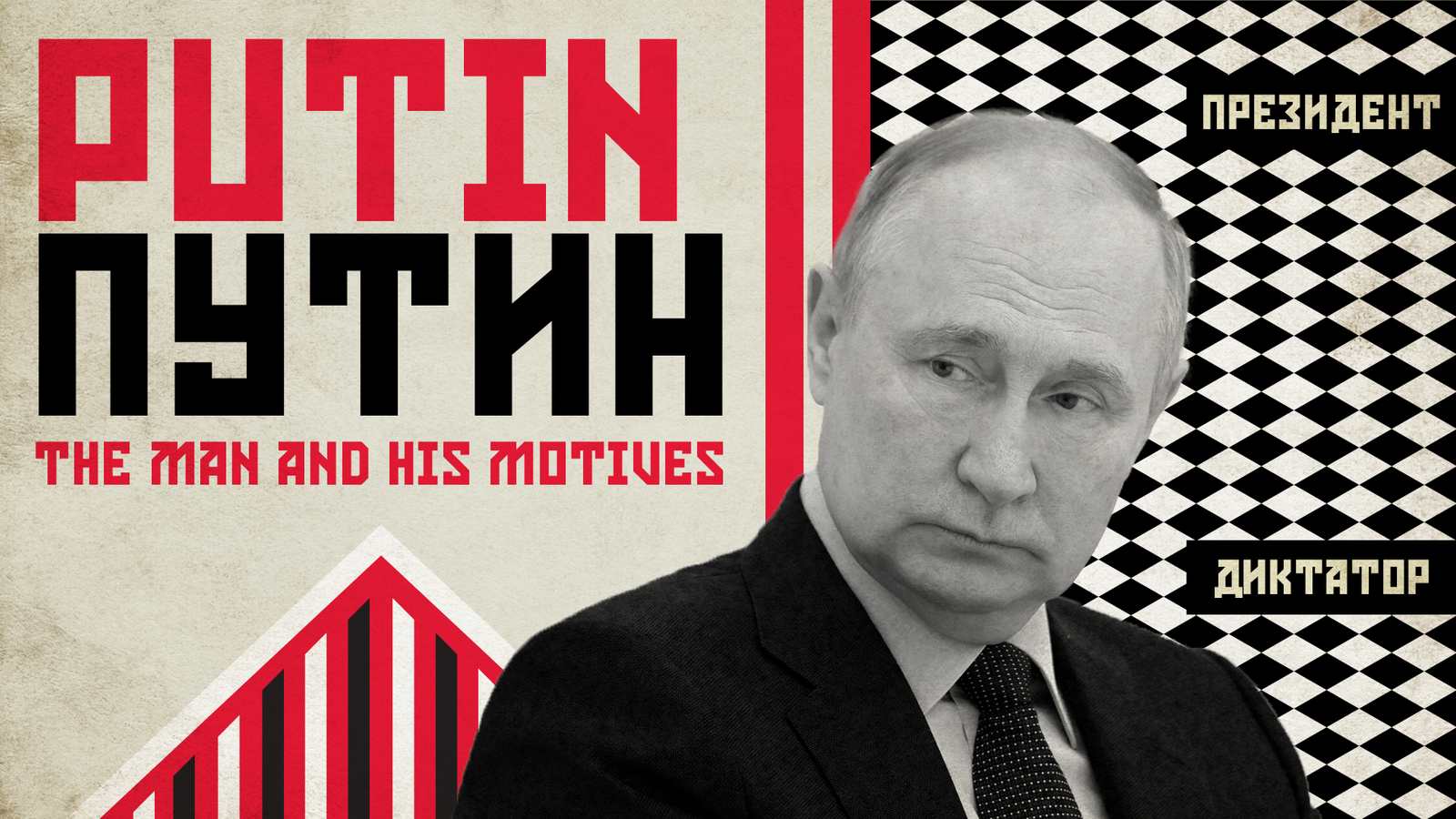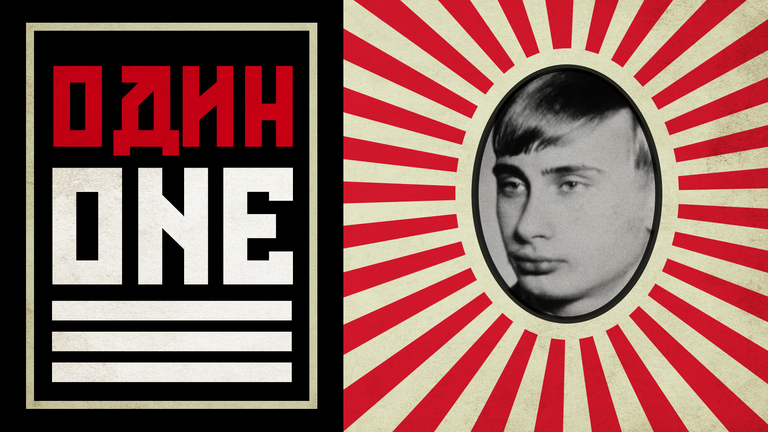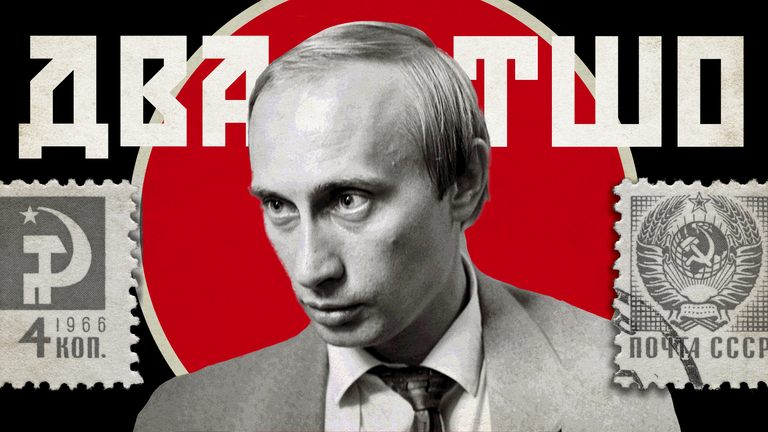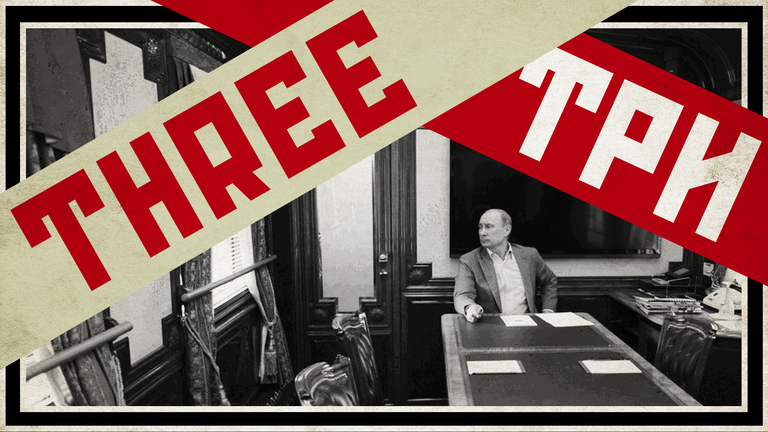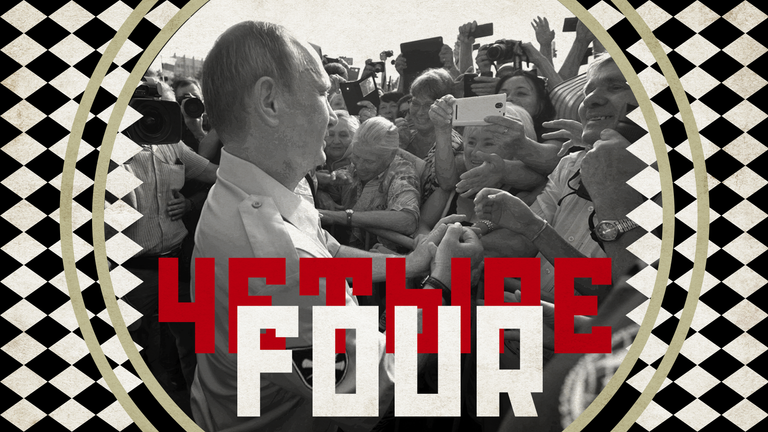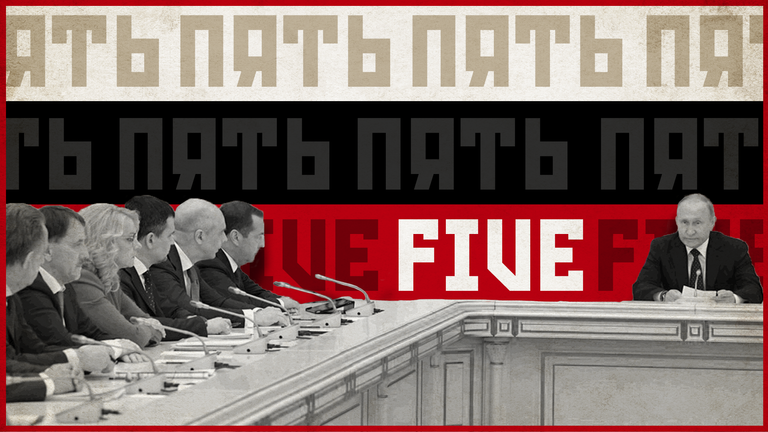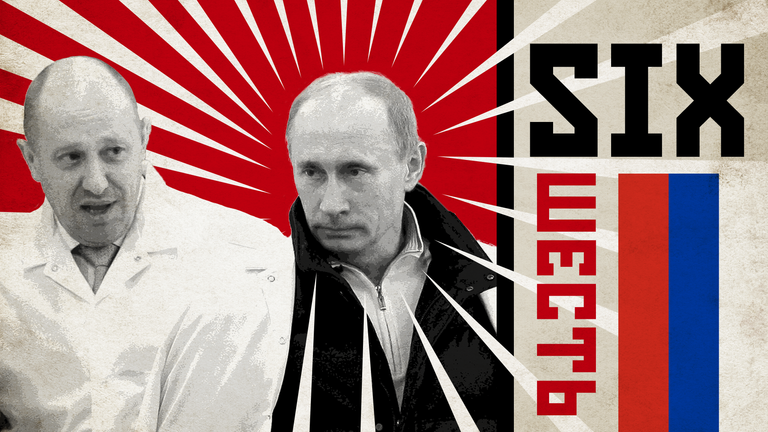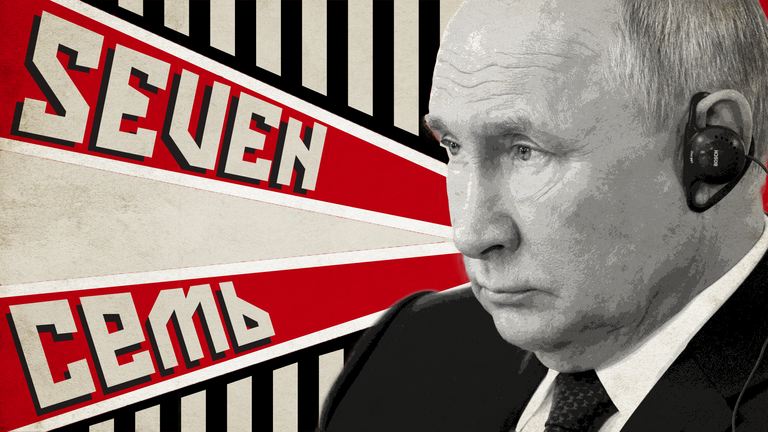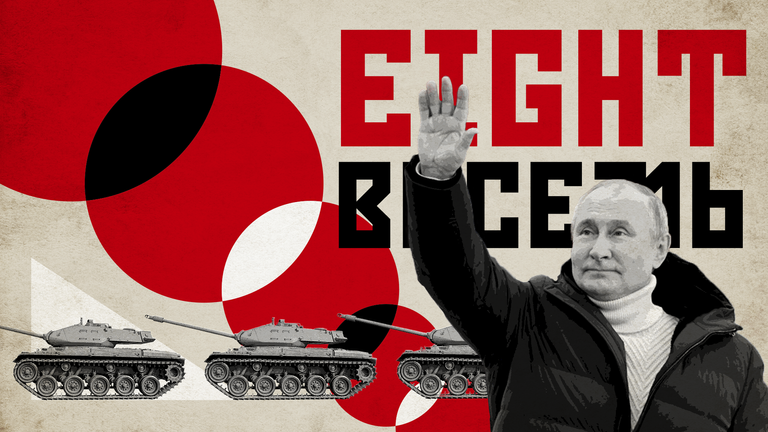Vladimir Putin is the man who brought war back to Europe, by sending his tanks into Ukraine on 24 February last year.
Little is known about the murky workings of the Kremlin and of Mr Putin’s state of mind – to his citizens, he is both “the old man” and the symbol of Russia. To his Kremlin associates, he offers a means of clinging to power and wealth.
In our Ukraine live blog this week we ran an eight-part series posing questions to experts about what the Russian president’s motivations are.
Here’s what they said.
Part one: How has Putin’s early life impacted his career?
Vladimir Putin grew up in the ruins of post-war Leningrad – now known as St Petersburg – and from a young age was running with street gangs.
His childhood experience was “relatively rough” and left him “constantly looking for security” with an awareness of “actually how dangerous and precarious life can be”, said Mark Galeotti, principal director of Mayak Intelligence and a senior associate fellow at the Royal United Services Institute (RUSI).
He was left wanting to join the “biggest gang in town”, and so after he left university he joined the KGB – the security service for the then Soviet Union.
The young Putin was also described by Philip Short, journalist and author of Putin: His Life And Times, as a “bit of a tearaway” and a “young hooligan” – although “not quite so much as he later made out”.
Even as a youth, he would play his cards close to his chest and “never gave very much away about himself or what he was thinking”, Mr Short said – traits he has carried on into his presidency.
“He was actually quite bright and surprised his classmates by the way he understood difficult Russian writers like Gogol,” the author said.
Then there was also his propensity for taking “crazy risks”.
“When he became older, he was aware of that and compensated by being extremely cautious,” Mr Short said.
But of course, there have been major exceptions – not least the war in Ukraine, which he is now “personally invested” in.
Part two: How did the fall of the Soviet Union impact Putin?
The Soviet Union – made up of 15 republics, including Russia, Ukraine and Belarus – was once the largest nation in the world, occupying nearly a sixth of the Earth’s land surface.
When it fell and dissolved in 1991, it was a major shock to those living under its rule.
“It was a huge transition which people in most countries don’t go through. From being part of a superpower which had enormous political and geopolitical reach, to suddenly finding you were part of Russia,” said Mr Short.
For Russians, it meant that many of the assumptions they grew up with were now said to be false, he said.
“It was extremely difficult – a really terrible period that they had to go through in the 1990s,” he continued.
Dr Alan Mendoza, founder and executive director of the Henry Jackson Society, said this “clearly affected [Putin] very significantly”.
“I’m not sure Putin was necessarily a believer in communism but he was a believer in the system, that much was evident,” he said.
Mr Putin, who would likely have wanted to work his way up the KGB, would have seen his aspirations “torn apart”, Dr Mendoza said.
He saw the “chaos” of the 1990s in Russia, and for the last 20 years has been trying to restore the “lost empire”.
Dr Mendoza added Mr Putin’s long-held sense of Russian nationalism and imperialism – reflected in his view of Ukrainians not being “real people” – goes all the way back to “that trauma of the lost Soviet Union”.
Part three: Why is Putin so afraid of being assassinated?
Repeated reports have emerged that Mr Putin is scared of being assassinated – and it’s tricky to say how much is paranoia, and how much could be grounded in evidence.
“I think once you’ve been in power for as many years as Putin has, your natural state is paranoia,” said Dr Mendoza.
He added: “You see it in that you don’t know where the guy is at any given time, [and he’s] meeting people with extreme distances between them. There’s clearly a sense that people are out to get him – it’s on his mind, very much so.
“Some people probably are out to get him. After 25 years at the top, you do amass enemies along the way – but part of it is imagined.”
Professor David Lewis, an expert in global politics at the University of Exeter, thinks it may go back further.
“Putin has always had a strong sense of insecurity, perhaps stemming from his background in the KGB and his experience of the collapse of the USSR,” he said.
The Russian president believes it is his mission to “break the dominance of the West in international politics and ‘make Russia great again'” – so it is “not surprising” he believes Western security services, Ukrainian intelligence and Russian rivals are all plotting against him.
It could also be the “inevitable result of being the absolute ruler of a rather cannibalistic system”, said Mr Galeotti.
“Putin encourages his various underlings to compete against each other. And I think that’s in part because he assumes that frankly, that’s the natural order.”
Part four: Does Putin care about what ordinary Russians think?
For Mr Galeotti, there are two reasons why Mr Putin actually does care about how he looks to Russian citizens.
Mr Putin is “clearly thinking about his historical legacy and how future generations will remember him”, he said.
But also, on a more pragmatic level, “the most successful police states are the ones in which those who are being controlled don’t realise it, or actually end up backing the regimes exploiting them”.
For Russians, he said, there are two Putins – and it’s reflected in the fact his approval ratings tend to be about 80%, while his trust ratings lean closer to 30%.
So why would Russians approve of someone they don’t trust?
“There’s Putin, the icon of Russia – that becomes a representation … If people are asked if they approve of Putin, it’s whether you approve or not of Russia.
“There’s also Putin the politician, the human being, and I think that is reflected by the trust rating.”
Still, Mr Galeotti said there is now increasingly a sense that Mr Putin’s “sell-by date has come and gone”.
“I remember last time I was travelling in Russia, before I was banned, I was eavesdropping hearing people refer to him as the ‘old man’.”
Sir Andrew Wood, a former British ambassador to Russia, says there is a level of apathy from Russians.
“They’d rather not think about it. This is actually quite typical. If you go back to the way they look back at Stalin times and Soviet times, there are all sorts of things they’d rather not think about,” he said.
Sir Andrew added: “So the way [Mr Putin] portrays it as a time of triumph and Russia was great, they won the war in 1945, they take that as absolutely fine. It proves that they’re great people, but they don’t think about the number killed in the camps, the number of people killed on the battlefield. They don’t like to think about that because it’s too hurtful.”
Part five: What does Putin’s close circle in the Kremlin think of him?
This can be a difficult question to answer, even for those who have studied Russia for many years.
Sir Andrew said one of Mr Putin’s main characteristics is to “speak to as few people as he can” – meaning there are few people in the Kremlin, and even fewer in the close circle around him.
John Foreman, who was recently Britain’s defence attaché in Moscow, said the close circle would have been together for 25 to 30 years.
Russia has a “very different nature of power” based on “personality, friendships and old links”, he said.
“These decisions are taken by blokes who used to go to school together, to chat with each other, or play Judo and so on.”
Mr Foreman continued: “They all know that they rely on Putin for power and wealth. So when they have private thoughts about Putin, they would never express those in public when they know the consequences of moving against each other and being seen to be disloyal.”
They are not “stupid people” and they are aware of what is happening with the war, he said, but “at this stage they have calculated that it’s better to stick with who you know than risk a change of leadership” – and face losing their positions, and possibly their lives.
Professor Lewis agrees Mr Putin’s close circle has an “enormous amount to lose” if he is ousted from power.
But he also thinks many of those around Mr Putin share his worldview – with some taking an even more extreme position – believing the West is a “hostile force” that is “using Ukraine as a proxy to attack Russia”.
Sir Andrew believes Mr Putin’s close circle is now focusing only on the war, with most of the institutions that normally make up a government now abolished.
“At the beginning, he did have a government. He did have people who could advise him on the economy,” he said.
But those with local authority across Russia have “all been effectively sent out”, so the decisions Mr Putin makes now are “very much based on what he believes”, Sir Andrew said.
Part six: Why would Putin meet Prigozhin for tea after branding him a ‘traitor’?
The Russian private mercenary group Wagner, led by its founder Yevgeny Prigozhin, staged a short-lived rebellion against Moscow’s military leaders in June.
Soon after, it emerged Prigozhin – who Mr Putin had branded a “traitor” – had gone for tea with the Russian president.
And last month, he appeared at a summit between Russia and African leaders. So, what is going on?
“The meeting makes more sense if you think of Putin’s Russia as similar to a mafia organisation,” said Professor Lewis.
“There is no rule of law, but only informal agreements among rival groups brokered by Putin as a kind of godfather figure.”
He said it would have made sense for Mr Putin to broker an “informal deal” to keep Prigozhin alive and a small Wagner force intact, but keep it under the heel of the Kremlin so it can do Moscow’s bidding in parts of Africa and elsewhere.
Mr Short, the author and journalist, agrees that Mr Putin “still sees a role” for Prigozhin, at least for now.
He says that when Mr Putin was deputy mayor of St Petersburg, he “had to deal with criminal types like Prigozhin and he found ways of dealing with them, ways of making use of them”.
“The system that he’s built as president relies on playing off one faction against another, one group against another, so that no group can become too powerful and can actually threaten the central power,” Mr Short added.
Mr Foreman said the Russian president had appeared “disturbed” and “upset” as the rebellion took place.
But Prigozhin’s meeting with Mr Putin would have been like the warlord “bending knee before its master, begging for forgiveness, and pledging his loyalty”.
Still, it appears Prigozhin’s future prospects likely hang in the balance.
“He has powerful enemies, Prigozhin, and what happens to him in the medium term I think is different to what happens to him in the short term,” Mr Foreman said.
Professor Lewis added: “In any case, Prigozhin should not relax too much. Putin’s career suggests that he firmly believes the old adage – that revenge is a dish best served cold.”
Part seven: Will Putin ever back down in Ukraine?
The “myth of [Putin’s] power has been tarnished” over more than 500 days of war, said Mr Foreman – but that doesn’t mean he will back down.
“I still think he’s all into his mission. I think he thinks his mission is very historic … it’s part of his personal legacy,” he said.
Mr Foreman said the Russian president will be acutely aware of the consequences for him personally if he fails in Ukraine, and therefore there is “no price [Russia] won’t pay”.
“There’s no cost in either national wealth or people they won’t pay. Nobody’s spoken in public against it, he’s got no opposition at home.”
Mr Putin views the West as “utterly weak”, Mr Foreman said, so it will take Russia being defeated on the battlefield for Moscow’s troops to be pulled out, in his view.
“I think the only hope for Russia is the Ukrainians manage to kick the Russians out,” he said, although this is “looking less likely this year”.
Dr Mendoza, founder and executive director of the Henry Jackson Society, said Putin will also be aware of the historical context.
The last Soviet leader to gamble with such high stakes was Nikita Khrushchev during the Cuban missile crisis – a 13-day showdown between the US and Russia widely considered to be the closest the world has come to nuclear Armageddon.
Dr Mendoza said the same question was posed during that crisis: “Can Khrushchev back down?”
“And it turns out that he could back down but the parole was up and, of course, he was removed from power afterwards.”
Therefore it’s possible Mr Putin may back down, but Dr Mendoza said: “He’ll be fully aware of the Khrushchev comparison.”
He added: “Having basically staked his whole life’s work on winning this war, it’s very difficult to see how [Putin] could back down and then survive the repercussions.”
Part eight: What happens to Putin if he loses the war in Ukraine?
It’s worth remembering that Russia has occupied parts of Ukrainian territory, in Crimea and in the Donbas region, since 2014.
While Ukraine’s goal is to recapture all territory taken by Russia since then – not just areas occupied since the 2022 invasion – military analysts believe this will be extremely difficult to achieve.
Therefore, it’s tricky to say when exactly Russia has “lost” the war.
“Russia only loses the war when Putin says so. Even if the Ukrainian military inflicts a major defeat on Russian troops and forces them to withdraw from most Ukrainian territory, Russia could still fight on in Crimea and the Donbas and continue to attack Ukrainian cities with missiles,” said Professor Lewis.
“Russia’s powerful propaganda machine would try to sell defeat as victory.”
Mr Short said the Russian president would be able to claim victory if Moscow were able to hold onto anything more than it had at the beginning of the 2022 invasion.
He said the Russian president would use this against the West, which is supporting Ukraine, to say: “All of them came in and backed Ukraine, and we still managed to get more than we had before. They hadn’t been able to prevent us.”
But Professor Lewis said if Ukraine managed to keep its pre-2022 territory, Mr Putin’s credibility would be “severely damaged” and Russia’s political elites “would probably decide that Putin had become a liability and look for a change”.
“A far-right militaristic regime might emerge that would seek revenge for Russia’s defeat,” he said.
“But it is more likely that Putin would be replaced by a figure from his current entourage, who would look for a deal with the West to end the war.
“All scenarios are in play, including a period of chaos as different factions struggle for power.”
Mr Foreman, the recent British defence attaché to Moscow, said Mr Putin “spent the pandemic sitting in one of his bunkers reading history” and knows that in Russian history, dictators can and have been replaced.
“So he’s well aware, but whether he’s allowed to retire to a dacha [second home] or whether he’s killed… Russian transitions of power are normally associated with some form of blood. I think he clings on because he knows what will happen to him.”
Still, Mr Short believes it is highly unlikely the Russian army can be pushed totally out of Ukraine – and therefore Mr Putin’s position is “secure” – for the foreseeable future, at least.
